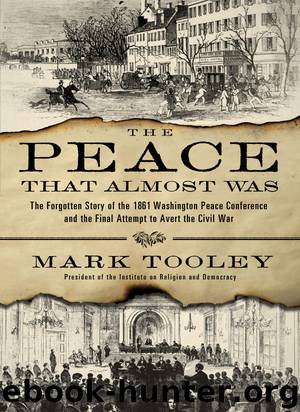The Peace That Almost Was by Mark Tooley

Author:Mark Tooley
Language: eng
Format: epub
Tags: ebook
Publisher: Thomas Nelson
Published: 2015-03-31T16:00:00+00:00
SIX
SECURING THE CAPITOL
I have said that any man who attempted by force or unparliamentary disorder to obstruct or interfere with the lawful count of the electoral vote for President and Vice President of the United States should be lashed to the muzzle of a twelve-pounder and fired out of a window of the Capitol.
—Lieutenant General Winfield Scott
Abraham Lincoln was formally announced as president of the United States on February 13, 1861, in a joint session of Congress. The Electoral College vote was read aloud by outgoing Vice President John Breckinridge, a pro-Southern Kentuckian who had been one of Lincoln’s three opponents in the 1860 election. All 131 members of the Peace Conference had been authorized by special vote of the US House of Representatives to attend the historic session. Of course, it was this election of the first openly anti-slavery president that had ignited the national crisis that prompted the creation of the Peace Conference. Many peace commissioners shared carriages together for the 1.3-mile ride down Pennsylvania Avenue from Willard’s Hotel to the expanding US Capitol, whose sprawling edifice sat amid stone blocks and lumber, with timber construction cranes perched overhead, preparing to mount the new giant dome.
US Army commander Lieutenant General Winfield Scott had, with others, heard many reports of plots to block the electoral vote count. From his new headquarters at Winder Building by the White House he diligently reinforced the federal city with what forces he could to deter any disruption to constitutional process. The forces totaled about 480 men of the army, supplementing 240 marines already based in the city. In January he told a congressional committee that he had received “80 to 90” letters, half of them anonymous, alleging plots aimed at Washington. Targets included the electoral vote count, but also the inauguration. He testified, “Some sort of conspiracy obviously exists, either for mischief or creating a false alarm.”1
The presence and exertions of the aged general and war hero were reassuring to Unionist Washingtonians, and perhaps to many others who simply hoped for order. He personally inspected much of the city in his carriage, and when he arrived at army headquarters he was greeted by passersby who removed their hats and shouted, “God bless you, General!”2
Others were less grateful, and many Southerners saw his securing the capital by armed force as intimidation, during the Peace Conference no less. This was a special betrayal, since Scott was a Virginian. A month before the electoral vote count, a Virginia congressman attacked Scott in a speech to the House of Representatives:
There was a time in her history when Virginia . . . when asked for her jewels, could point to her sons . . . Jefferson, Henry, Madison, Monroe, and the immortal Washington. . . . She too, in this age, has been proud of another son, whom, she gave to the nation as the commander-in-chief of its armies. That son I, together with her representatives in the legislature, in her name, have honored with a sword for his brilliant achievements in arms.
Download
This site does not store any files on its server. We only index and link to content provided by other sites. Please contact the content providers to delete copyright contents if any and email us, we'll remove relevant links or contents immediately.
The Secret History by Donna Tartt(19023)
The Social Justice Warrior Handbook by Lisa De Pasquale(12182)
Thirteen Reasons Why by Jay Asher(8882)
This Is How You Lose Her by Junot Diaz(6869)
Weapons of Math Destruction by Cathy O'Neil(6260)
Zero to One by Peter Thiel(5782)
Beartown by Fredrik Backman(5729)
The Myth of the Strong Leader by Archie Brown(5491)
The Fire Next Time by James Baldwin(5422)
How Democracies Die by Steven Levitsky & Daniel Ziblatt(5209)
Promise Me, Dad by Joe Biden(5139)
Stone's Rules by Roger Stone(5078)
A Higher Loyalty: Truth, Lies, and Leadership by James Comey(4945)
100 Deadly Skills by Clint Emerson(4910)
Rise and Kill First by Ronen Bergman(4772)
Secrecy World by Jake Bernstein(4736)
The David Icke Guide to the Global Conspiracy (and how to end it) by David Icke(4696)
The Farm by Tom Rob Smith(4500)
The Doomsday Machine by Daniel Ellsberg(4480)
